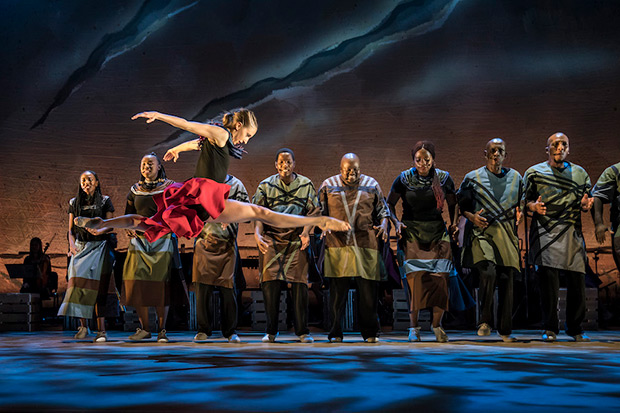
© Johan Persson. (Click image for larger version)
Sisters Grimm
Inala
★★★★✰
London, Peacock Theatre
1 May 2019
www.inala.co.uk
peacocktheatre.com
It is a decade since the genesis of a first Zulu ballet arose from Ella Spira and Pietra Mello-Pittman (collectively, the Sisters Grimm) attending a concert by Ladysmith Black Mambazo at the Cadogan Hall. On their subsequent fact-finding trip to South Africa, the ballet’s one-word title – meaning either “harvest to reap” or “an abundance of goodwill” – was spotted as graffiti on a wall. After an initial fruitless ambition for a one-act classical work for The Royal Ballet (where Mello-Pittman was then a dancer), Mark Baldwin came on board to provide the essential neoclassical weight and heat in his choreographic interpretation of Zulu movement. Two years’ later, in 2014, the full two-act ballet premiered at the Edinburgh Festival.
Those five years of Inala’s gestation have been followed by another five years’ tinkering – during which time Sisters Grimm also created their follow-up production, Voices of the Amazon – making both numerical and personnel changes to the dancing cast and increasing the number of songs from an initial sixteen to the present twenty-one, including the replacement of some original numbers. A gunshot that closed act one and the resultant funeral that opened act two have also been discarded.
The most significant change in this latest iteration is the Soweto Gospel Choir replacing Ladysmith Black Mambazo, which has impacted on the production in many ways. There is now the diversity of female voices in the mix; the age profile is younger, tightening the movement interaction between singers and dancers; and their gospel delivery is distinctly different from the Ladysmith sound (Spira notes that the latter sang slightly behind the beat, whereas the Soweto singers anticipate it).

© Johan Persson. (Click image for larger version)
The endearing nucleus of Inala lies in the enchanting Grammy-nominated score, jointly composed by Spira and Ladysmith Black Mambazo’s founder and musical director, Joseph Shabalala, together with other members of the choir (several of whom are also from the Shabalala clan). Songs vary from yearning sadness to jaunty enthusiasm, cleverly interlaced and complemented by Adrian Rhodes’s soundscape of African nature and birdsong.
There is no overarching story to Inala, but each song has its own simple narrative. Midway through the first act, the fervent Eza Malobolo expresses how a young man has found “a nice lady” and wants to pay a dowry (in cattle) so that he can marry her. These nuptials end badly since later in the second act, the lyrics of Zombuya Nini Na demand that the dowry should be repaid, followed by the refrain of Uhlulekile Umakoti, confirming that the cows will be returned because the “the bride has failed” (one wonders in what way). However, the roundabout of love continues with the next song again expressing the excitement of courtship (Mana Kancane) and this Zulu ballet concludes with a trio of songs that emphasise the joys of home, finishing on a sentimental upbeat with the soulful Woza Sambe. Throughout all these songs, the nine-strong Soweto Gospel Choir evince the narrating force of an opera chorus.
Ashleigh Wilson, a tall South African dancer with blonde hair in long braids flowing alongside the tail feathers of her headdress, was a commanding, warrioress presence; as was the other returning member of the original cast, Adelene Stanley. Notable newcomers included the yin and yang of reigning BBC Young Dancer, Nafisah Baba – piercing eyes and black leather – contrasted with the relaxed elegance of Elly Braund. Sharia Johnson (who joined the cast for the 2015 run) and Nahum McLean were other strong dancers to catch the eye, together with the charismatic vivacity of a petite Soweto woman singer (unfortunately not individually credited in the programme) who was almost indistinguishable from the professional dancers in her movement quality. The choreographic structure seemed even tighter than I recall from the earlier iterations with no loss of momentum in smooth transitions between each song and a ubiquitous, seamless connection between singers and dancers.
This third iteration of Inala under the Sadler’s Wells umbrella (it opened and closed the main theatre’s 2014/15 season) seems refreshingly new and the abundance of goodwill promised by the Zulu title was all-pervasive. It delivered an uplifting and thrilling experience, which sent me home with a spring in my step and stirring songs on auto-repeat in my head. In my review of the London premiere, back in September 2014, I opined that Inala should be ‘a runaway success’ and I’m pleased to confirm that, refreshed in this new guise, it is still running and an even more appreciable success.


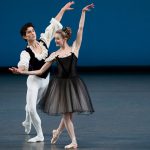



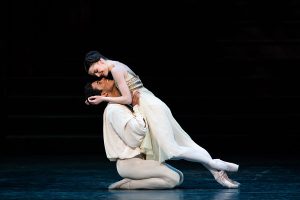
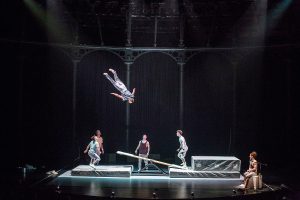
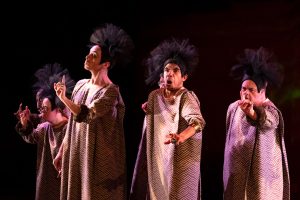
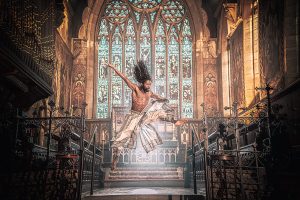

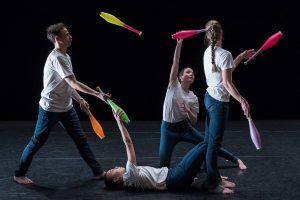
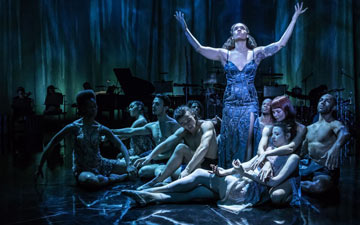
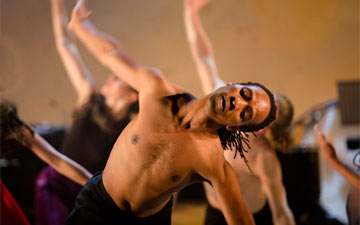

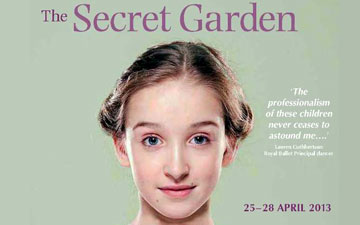
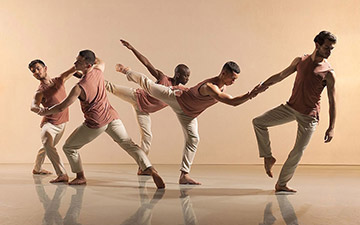
You must be logged in to post a comment.